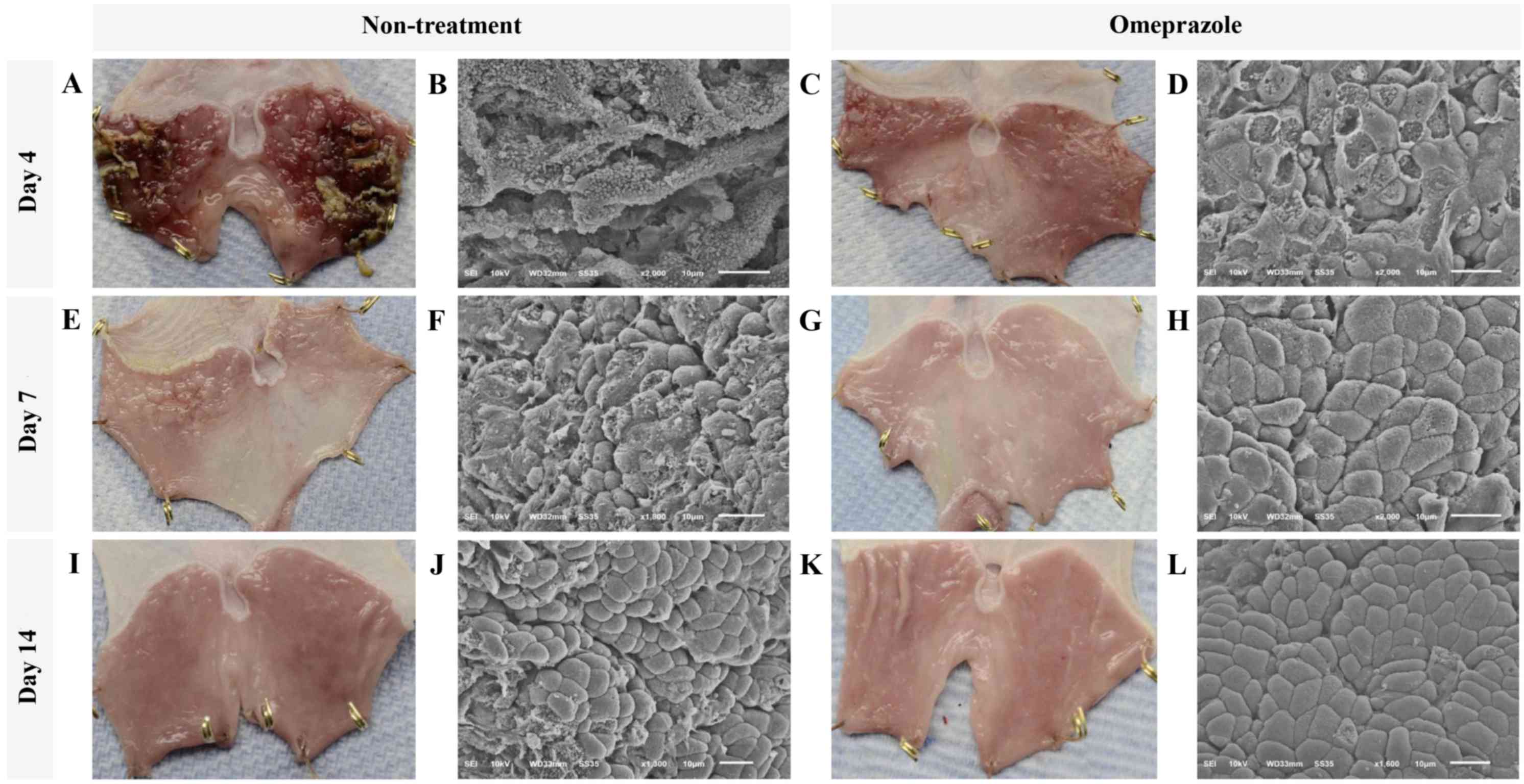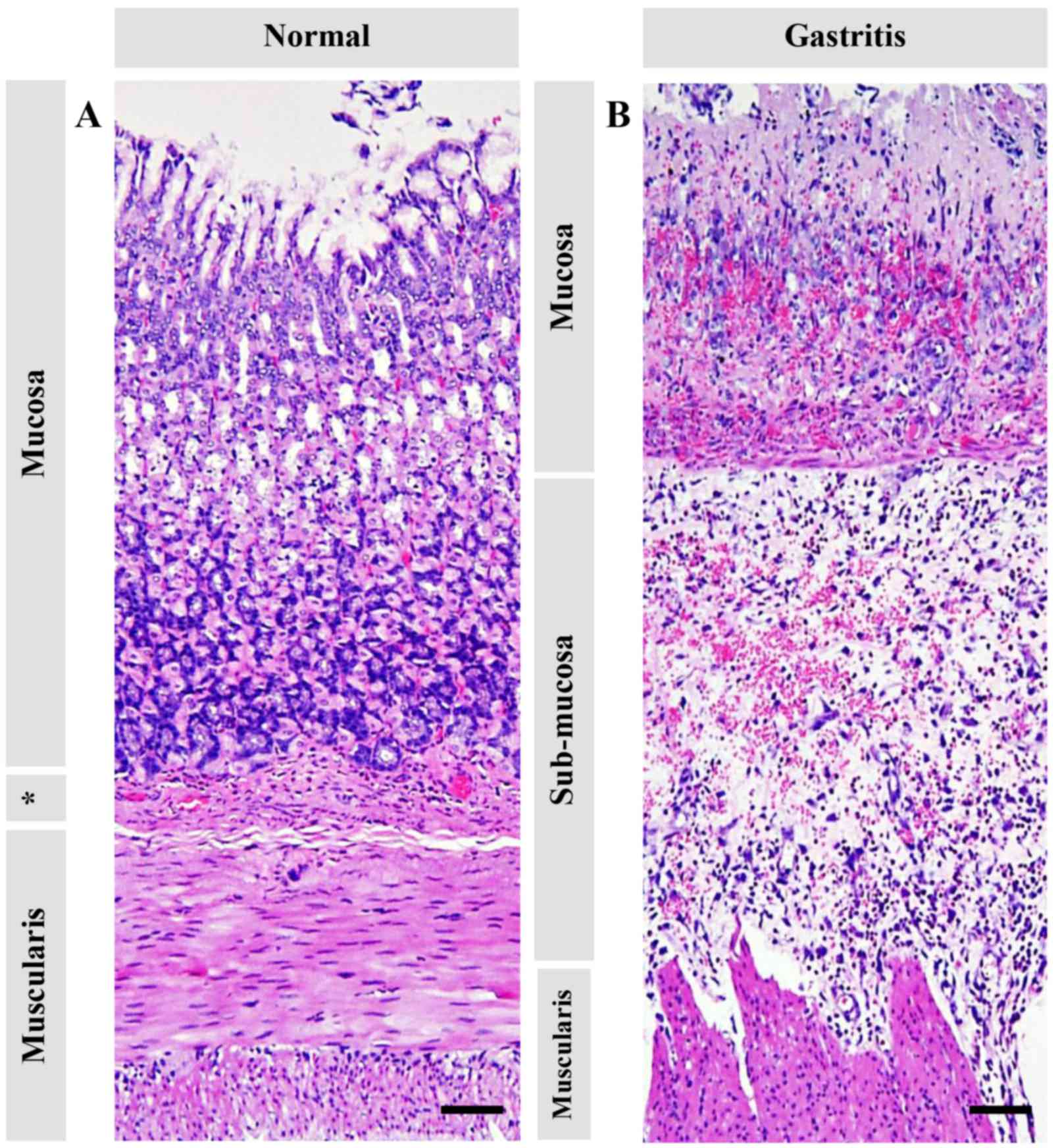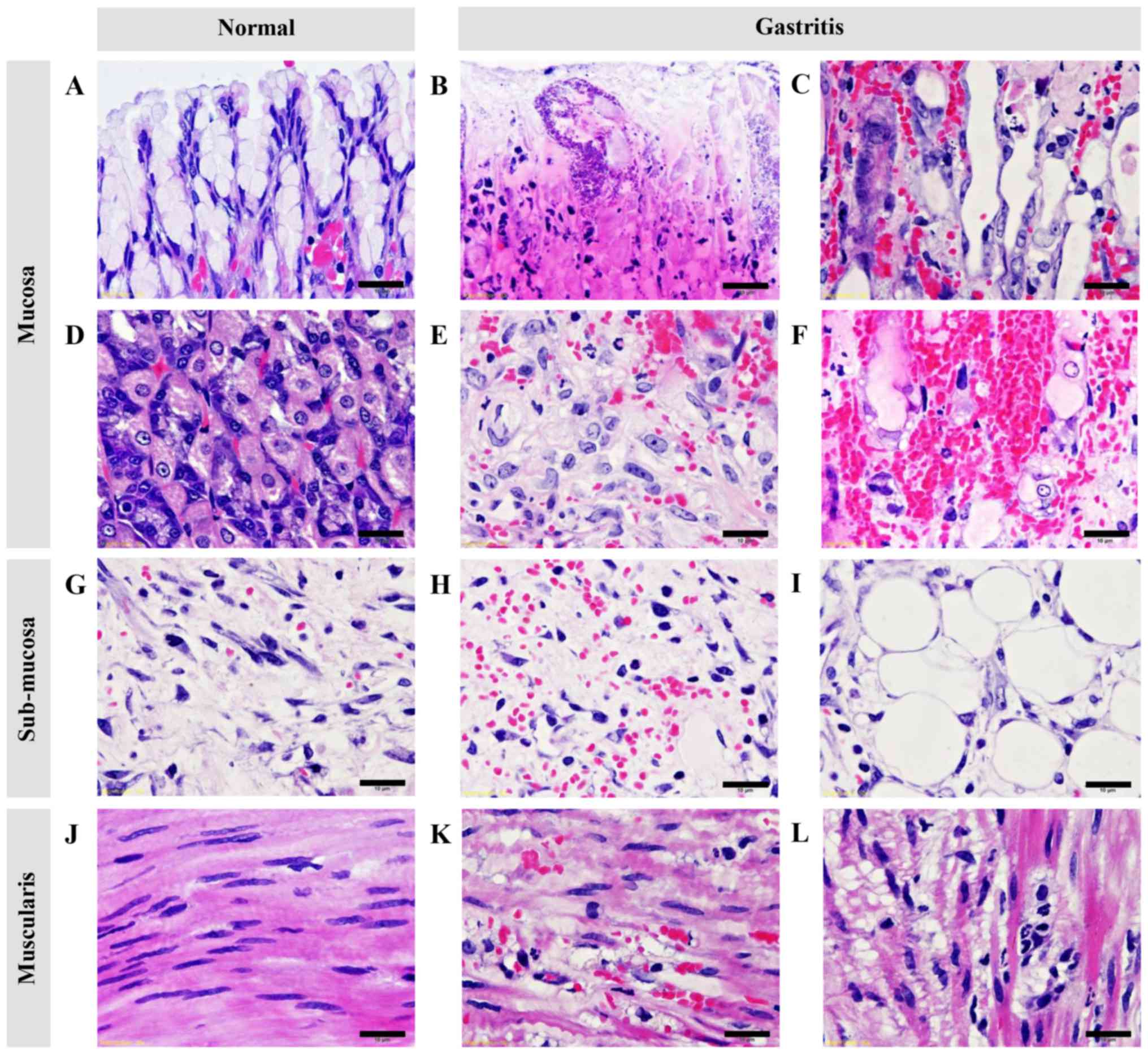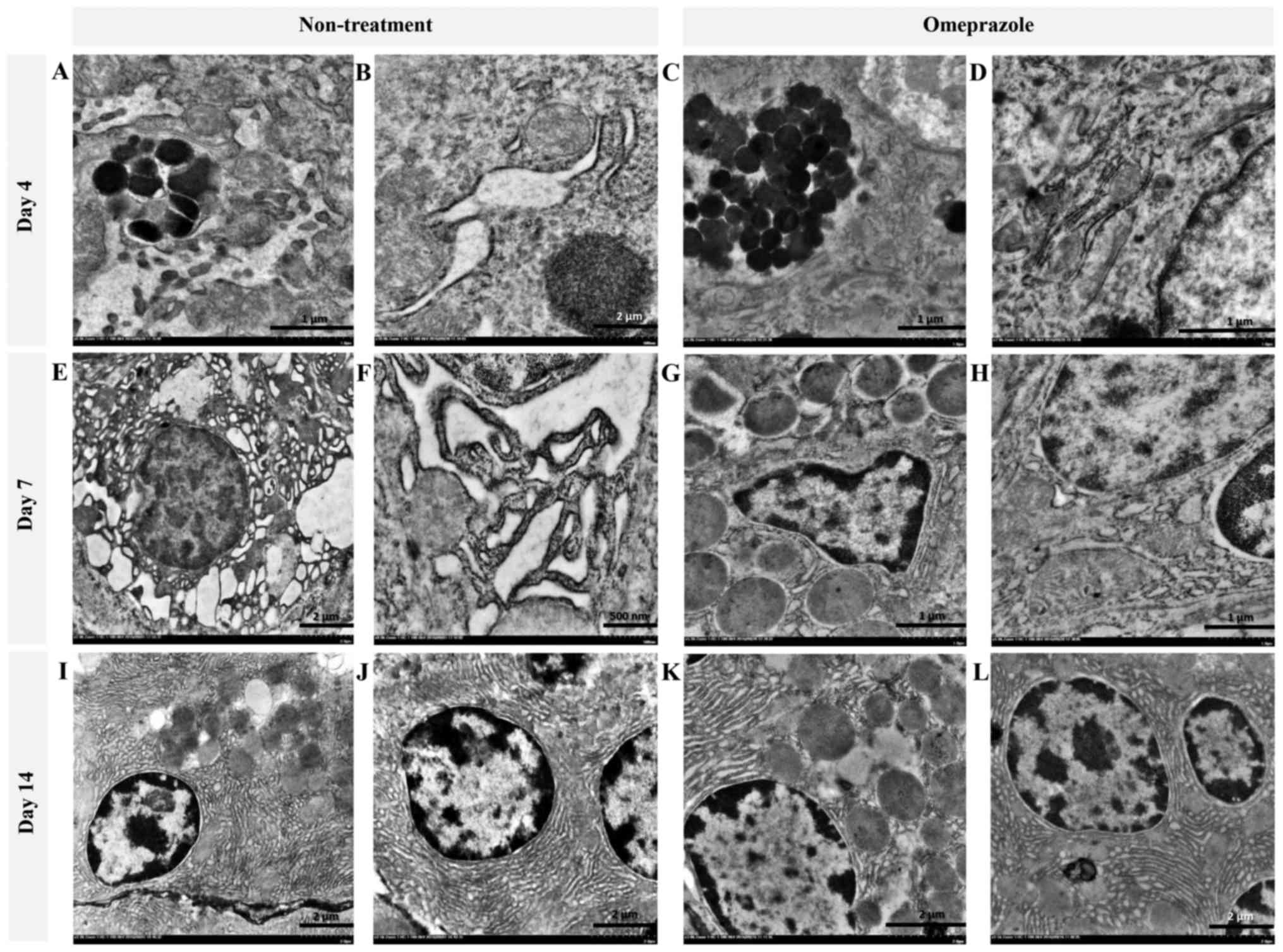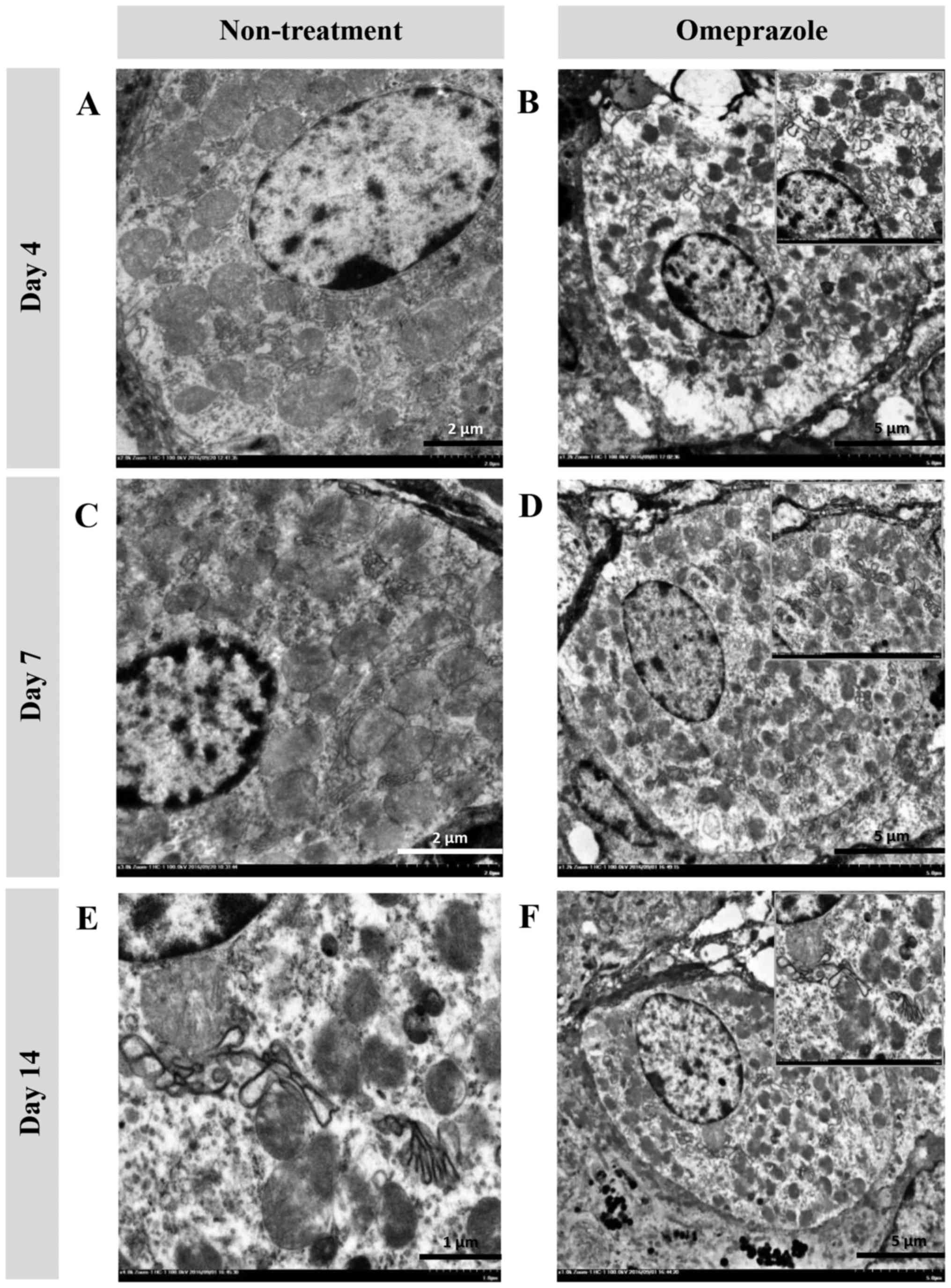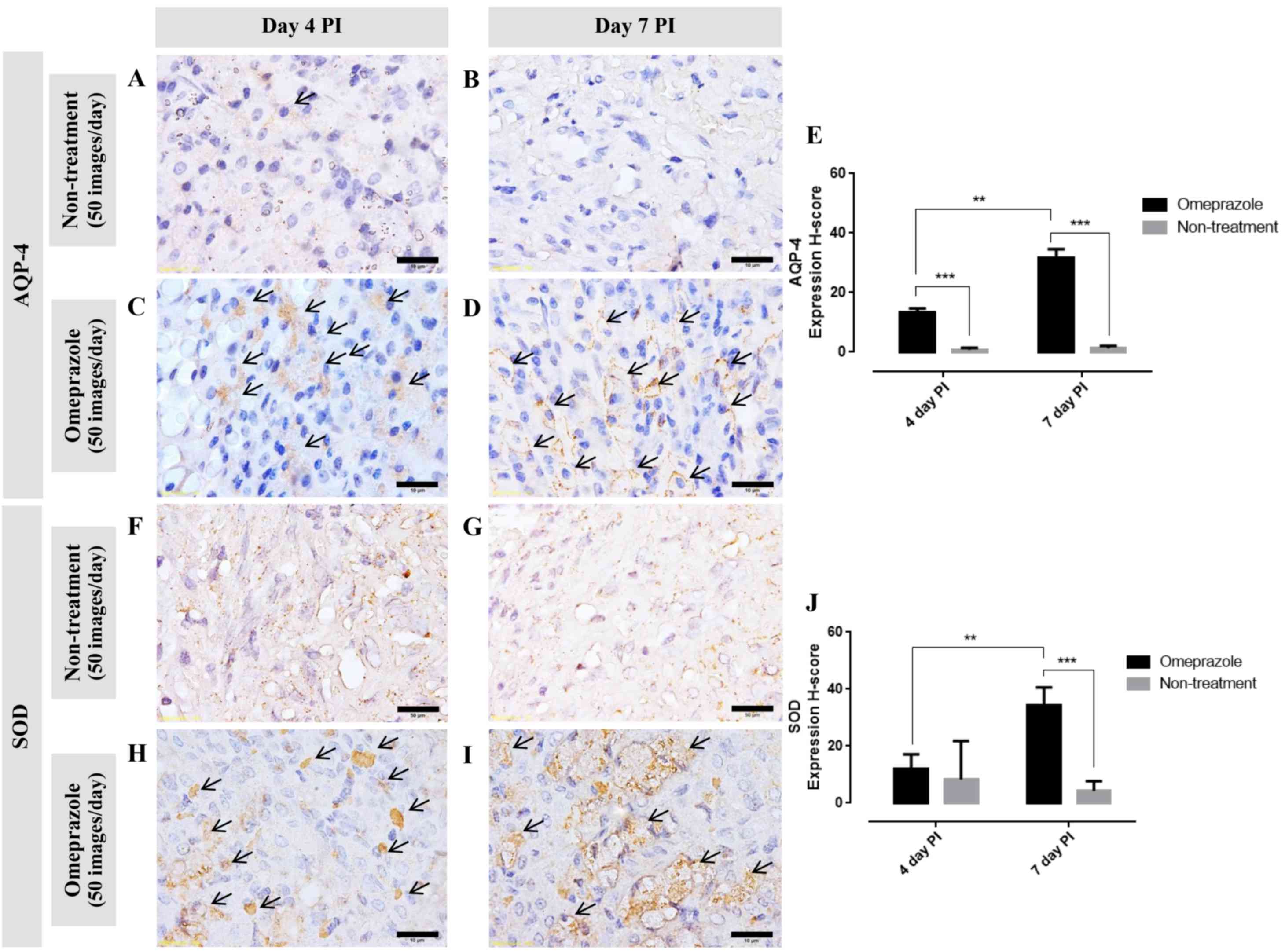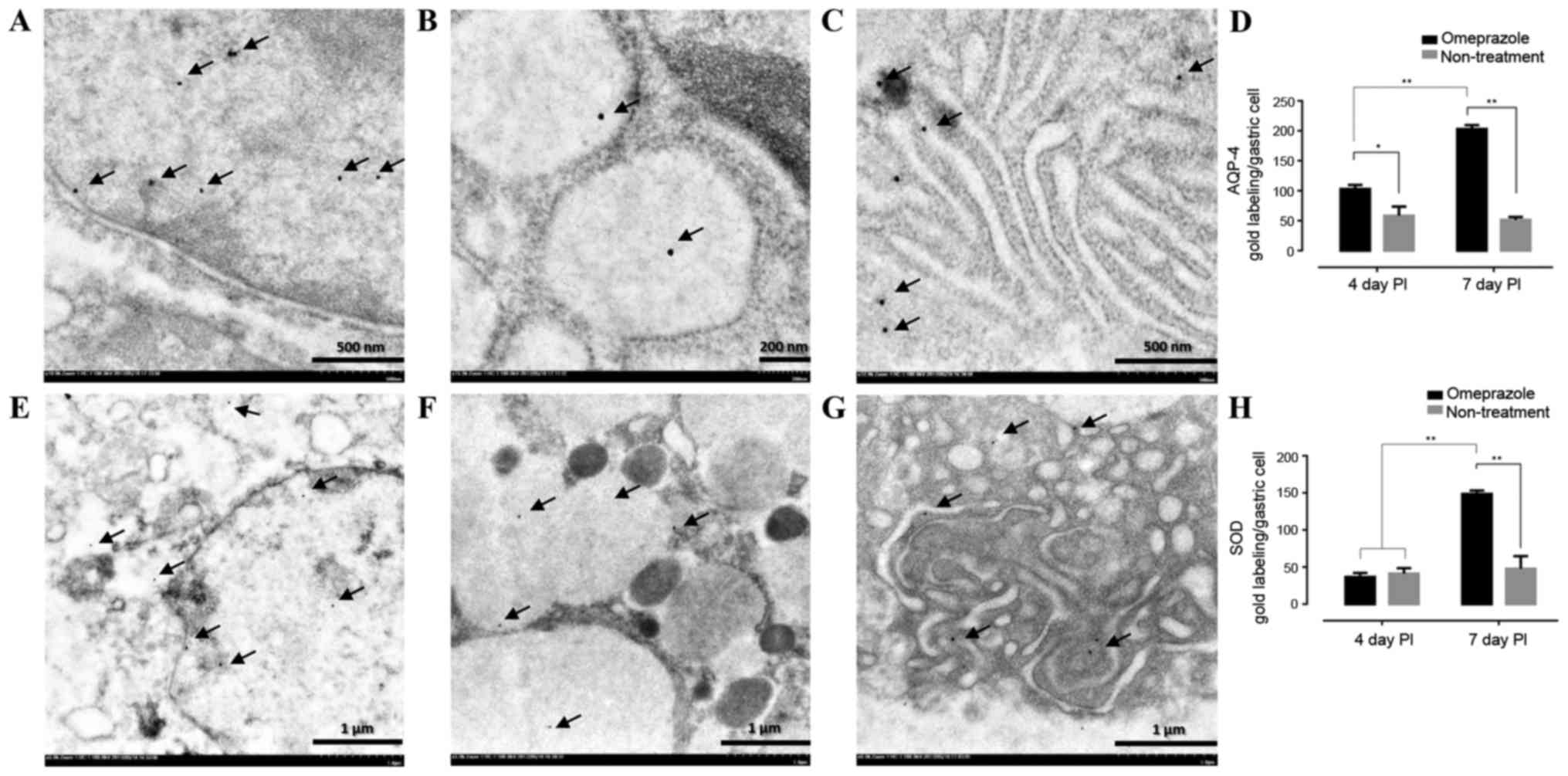|
1
|
Schneider AS and Szanto PA: Board Review
SeriesPathology. Fifth Edition. Lippincott William & Wilkins;
Philadelphia, PA: 2013
|
|
2
|
Al-Humayed SM, Mohamed-Elbagir AK,
Al-Wabel AA and Argobi YA: The changing pattern of upper
gastro-intestinal lesions in southern Saudi Arabia: An endoscopic
study. Saudi J Gastroenterol. 16:35–37. 2010. View Article : Google Scholar : PubMed/NCBI
|
|
3
|
Lou LX, Geng B, Yu F, Zhang J, Pan CS,
Chen L, Qi YF, Ke Y, Wang X and Tang CS: Endoplasmic reticulum
stress response is involved in the pathogenesis of stress induced
gastric lesions in rats. Life Sci. 79:1856–1864. 2006. View Article : Google Scholar : PubMed/NCBI
|
|
4
|
Suzuki H, Nishizawa T, Tsugawa H, Mogami S
and Hibi T: Roles of oxidative stress in stomach disorders. J Clin
Biochem Nutr. 50:35–39. 2012. View Article : Google Scholar : PubMed/NCBI
|
|
5
|
Zarebska A, Sekita-Krzak J, Hernik D,
Matusiewicz J and Czerny K: Histological examinations of chief and
parietal cells of the rat gastric glands after experimental
administration of cephalexin and ethanol. Ann Univ Mariae Curie
Sklodowska Med. 59:99–104. 2004.PubMed/NCBI
|
|
6
|
Karam SM: A focus on parietal cells as a
renewing cell population. World J Gastroenterol. 16:538–546. 2010.
View Article : Google Scholar : PubMed/NCBI
|
|
7
|
Teschke R, Wolff A, Frenzel C, Eickhoff A
and Schulze J: Herbal traditional Chinese medicine and its evidence
base in gastrointestinal disorders. World J Gastroenterol.
21:4466–4490. 2015. View Article : Google Scholar : PubMed/NCBI
|
|
8
|
Zaidi SF, Muhammad JS, Usmanghani K and
Sugiyama T: Review: Pharmacological ins and outs of medicinal
plants against Helicobacter pylori: A review. Pak J Pharm Sci. 28 3
Suppl:S1171–S1176. 2015.
|
|
9
|
Chanchal SK, Mahajan UB, Siddharth S,
Reddy N, Goyal SN, Patil PH, Bommanahalli BP, Kundu CN, Patil CR
and Ojha S: In vivo and in vitro protective effects of omeprazole
against neuropathic pain. Sci Rep. 6:300072016. View Article : Google Scholar : PubMed/NCBI
|
|
10
|
Matsuoka T, Kobayashi M, Sugimoto T and
Araki K: An immunocytochemical study of regeneration of gastric
epithelia in rat experimental ulcers. Med Mol Morphol. 38:233–242.
2005. View Article : Google Scholar : PubMed/NCBI
|
|
11
|
Fukuhara S, Matsuzaki J, Tsugawa H,
Masaoka T, Miyoshi S, Mori H, Fukushima Y, Yasui M, Kanai T and
Suzuki H: Mucosal expression of aquaporin-4 in the stomach of
histamine type 2 receptor knockout mice and Helicobacter
pylori-infected mice. J Gastroenterol Hepatol. 4 29 Suppl:S53–S59.
2014. View Article : Google Scholar
|
|
12
|
Matsuzaki J, Suzuki H, Minegishi Y, Sugai
E, Tsugawa H, Yasui M and Hibi T: Acid suppression by proton pump
inhibitors enhances aquaporin-4 and KCNQ1 expression in gastric
fundic parietal cells in mouse. Dig Dis Sci. 55:3339–3348. 2010.
View Article : Google Scholar : PubMed/NCBI
|
|
13
|
Rahim NA, Hassandarvish P, Golbabapour S,
Ismail S, Tayyab S and Abdulla MA: Gastroprotective effect of
ethanolic extract of Curcuma xanthorrhiza leaf against
ethanol-induced gastric mucosal lesions in Sprague-Dawley rats.
Biomed Res Int. 2014:4164092014. View Article : Google Scholar : PubMed/NCBI
|
|
14
|
Ampawong S and Aramwit P: Tolerogenic
responses of CD206+, CD83+, FOXP3+, and CTLA-4 to sericin/polyvinyl
alcohol/glycerin scaffolds relevant to IL-33 and HSP60 activity.
Histol Histopathol. 31:1011–1027. 2016.PubMed/NCBI
|
|
15
|
Wang QS, Zhu XN, Jiang HL, Wang GF and Cui
YL: Protective effects of alginate-chitosan microspheres loaded
with alkaloids from Coptis chinensis Franch. and Evodia rutaecarpa
(Juss.) Benth. (Zuojin Pill) against ethanol-induced acute gastric
mucosal injury in rats. Drug Des Devel Ther. 9:6151–6165.
2015.PubMed/NCBI
|
|
16
|
Cho KR, Kwon KY and Chang ES:
Ultrastructural study of alcohol-induced gastric mucosal change of
rat. Korean J Pathol. 27:362–370. 1993.
|
|
17
|
Zhang B and Jin R: Ultrastructural
characteristics of gastric mucosal epithelial cells of AIDS
patients complicated with chronic gastritis. Zhonghua Shi Yan He
Lin Chuang Bing Du Xue Za Zhi. 21:17–19. 2007.(In Chinese).
PubMed/NCBI
|
|
18
|
Zhang ZL, Bu JK and Zhao JX:
Ultrastructural observation of the gastric mucosa in chronic
gastritis patients treated by traditional Chinese medicine. World J
Gastroenterol. 3:185–188. 1997. View Article : Google Scholar : PubMed/NCBI
|
|
19
|
Ji C: New insights into the pathogenesis
of alcohol-induced ER stress and liver diseases. Int J Hepatol.
2014:5137872014. View Article : Google Scholar : PubMed/NCBI
|
|
20
|
Zhang K and Kaufman RJ: From
endoplasmic-reticulum stress to the inflammatory response. Nature.
454:455–462. 2008. View Article : Google Scholar : PubMed/NCBI
|
|
21
|
Kim I, Xu W and Reed JC: Cell death and
endoplasmic reticulum stress: Disease relevance and therapeutic
opportunities. Nat Rev Drug Discov. 7:1013–1030. 2008. View Article : Google Scholar : PubMed/NCBI
|
|
22
|
Malhotra JD, Miao H, Zhang K, Wolfson A,
Pennathur S, Pipe SW and Kaufman RJ: Antioxidants reduce
endoplasmic reticulum stress and improve protein secretion. Proc
Natl Acad Sci USA. 105:pp. 18525–18530. 2008, View Article : Google Scholar : PubMed/NCBI
|
|
23
|
Pan JS, He SZ, Xu HZ, Zhan XJ, Yang XN,
Xiao HM, Shi HX and Ren JL: Oxidative stress disturbs energy
metabolism of mitochondria in ethanol-induced gastric mucosa
injury. World J Gastroenterol. 14:5857–5867. 2008. View Article : Google Scholar : PubMed/NCBI
|
|
24
|
Sano R and Reed JC: ER stress-induced cell
death mechanisms. Biochim Biophys Acta. 1833:3460–3470. 2013.
View Article : Google Scholar : PubMed/NCBI
|
|
25
|
Apostolova N, Gomez-Sucerquia LJ, Alegre
F, Funes HA, Victor VM, Barrachina MD, Blas-Garcia A and Esplugues
JV: ER stress in human hepatic cells treated with Efavirenz:
Mitochondria again. J Hepatol. 59:780–789. 2013. View Article : Google Scholar : PubMed/NCBI
|
|
26
|
Chen GX, Lao SX and Huang ZX: Effect of
Chinese herbs on expression of aquaporin 3,4 gene in gastric mucosa
of patients with Pi-Wei Damp-Heat syndrome. Zhongguo Zhong Xi Yi
Jie He Za Zhi. 25:199–202. 2005.(In Chinese). PubMed/NCBI
|
|
27
|
Feng G, Xu X, Wang Q, Liu Z, Li Z and Liu
G: The protective effects of calcitonin gene-related peptide on
gastric mucosa injury after cerebral ischemia reperfusion in rats.
Regul Pept. 160:121–128. 2010. View Article : Google Scholar : PubMed/NCBI
|
|
28
|
Carmosino M, Procino G, Nicchia GP,
Mannucci R, Verbavatz JM, Gobin R, Svelto M and Valenti G:
Histamine treatment induces rearrangements of orthogonal arrays of
particles (OAPs) in human AQP4-expressing gastric cells. J Cell
Biol. 154:1235–1243. 2001. View Article : Google Scholar : PubMed/NCBI
|















